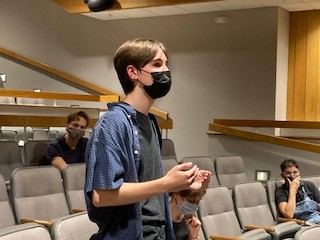
Bloomington, Ind. — Tilly Robinson and Alex Kutza (pictured), 17-year-old seniors at Bloomington High School South, look forward to voting for the first time in 2022. But they worry their votes won’t count for as much as they should, thanks to what they see as Indiana’s gerrymandered legislative districts.
“I am eager to exercise my democratic rights at the ballot box,” Robinson said Monday at the third redistricting hearing conducted by Indiana Senate Democrats after two held in Gary and South Bend last week.
“But I don’t know how I will convince my peers to vote, to advocate, to participate in democracy, if the message our public officials are sending is that they would rather cling to power than listen to the people.”
Also joining about 20 local Democrats at the hearing were Eivin Sandstrom and Rivkah Bunes, Indiana University freshmen from Indianapolis. Sandstrom said gerrymandering is “really fundamental to everything that happens inside the legislature. Issues like legalization of marijuana, a robust public transit system, those are really popular, but it means they don’t get addressed.”
Senate Democrats, unhappy with the single hearing that the Senate Elections Committee held after the Senate maps were made public, staged their own hearings in blue-voter strongholds of Gary, South Bend and Bloomington. Meanwhile, GOP-drawn maps kept moving forward Monday and appear to be slated for final approval this this week.
Republicans say the new House, Senate and congressional maps are fair and meet their goals of keeping communities of interest together and creating districts that are compact and equal in size. Democrats say the maps will lock in place a situation in which Republicans control a share of legislative and congressional seats that’s disproportionate to their voter support.
“If you care about working families, if you care about public education, if you care about reproductive justice, then you have to care about how these maps are drawn,” said Sen. Shelli Yoder, D-Bloomington.
No supporters of the GOP maps spoke at the Monday hearing, where audience members and Democratic legislators took turns criticizing the maps and the redistricting process. Several said a nonpartisan, independent commission should manage the inherently political task of drawing maps.
“Look, every single legislator has a conflict of interest,” said Rep. Matt Pierce, D-Bloomington.
In Bloomington and Monroe County, the issue of representation is reversed. In the city, Democrats control the mayor’s office and all nine council seats. In the county, all three commissioners and six of seven council members are Democrats. City and county officials say they will appoint politically balanced citizen panels to advise them on redrawing precinct and local election maps.
Senate Democratic Leader Greg Taylor, D-Indianapolis, said lawmakers should keep working on the issue regardless of what happens this week. “If we don’t do anything about it today, let’s at least, for the next decade, have something in place so this won’t happen again.”
But the young people at the hearing said they want progress now, not later. That was music to the ears of the legislators conducting the hearing.
“A lot of times my colleagues would say, ‘You guys are the future,’” Sen. J.D. Ford, D-Indianapolis, told the students. “I say you’re the present. You’re now.” — Steve Hinnefeld